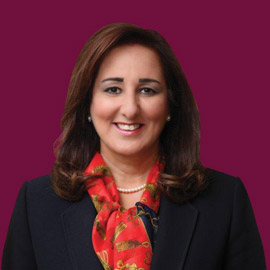For The Wilson Centre, Washington, DC
“People told me it was only for men,” says Reem Badran, Founder & CEO of Al Hurra for Management and Business Development and former member of the Jordanian House of Representatives, when speaking about her decision to run for the Amman Chamber of Commerce in the latest episode of the Riyada podcast from the Wilson Center’s Middle East Program. Badran is a Jordanian trailblazer and was recently named One of the World’s Most Successful Women in Business by the International Women’s Entrepreneurial Challenge Foundation in New York. In 2009, she became the first woman elected to the board of Amman’s Chamber of Commerce since its establishment in 1923. To this day, she remains the only woman to be elected to this post. “In our community [and] region, it is not easy for women to be able to penetrate the business community. It takes a while for people to believe in a woman and that she can have a successful business.”
Badran quickly realized that as a woman candidate she would have to work significantly harder than her male counterparts. Gender bias and discrimination discourage other women from also running, she says, often making Badran the only woman at the negotiating table. “I truly wish we had more women because it would be easier for me to present and discuss important issues, including how to include more women in entrepreneurship.”
A persistent barrier to women’s entrepreneurship and labor force participation is access to finance. Only 11 percent of women in Jordan own assets, a consequence of cultural and legal stigmas, says Badran. Women are encouraged and sometimes pressured by male family members to receive their inheritance through cash payments. Since the inheritance law in Jordan is based on Sharia law and gives men two-thirds of the assets or cash being inherited, women end up with very little, she says. Consequently, women often lack the necessary collateral for bank loans when they start a business. Further, men are often afforded fundraising opportunities through informal networks, while women are primarily outside of these circles, says Badran. “If you are not [in the circle], you will be excluded from being able to develop your business.” For this reason, Badran stresses, women in her country struggle to both start, grow, and accelerate their businesses.

